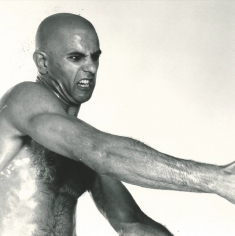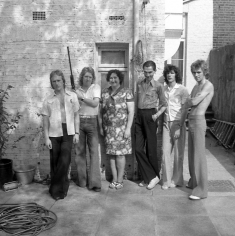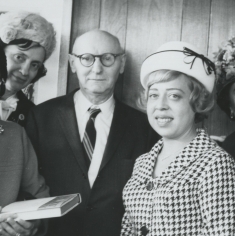If life is a play and all the world’s a stage, actor and activist Juliano Mer-Khamis epitomized the famous quote to its bitter end. On 4 April 2011, Mer-Khamis was assassinated by a masked gunman in the city of Jenin, where he’d established the Freedom Theatre. The shooter was never caught. “Juliano died as he’d lived, the stuff of Greek tragedies,” mourned filmmaker Avi Nesher.
Two women, an Israeli and a Palestinian, are trying to build a business partnership. Brought together by a shared business acumen and knowledge of the logistics industry, the two combine forces to help Palestinian businessmen navigate the everyday absurdities of Israeli control of the West Bank. But while they help their clients to overcome the obstacles of bureaucracy, who will help them overcome their own disputes?
Victor Grayevsky entered the pantheon of Israeli intelligence thanks to a single courageous and heroic action. While a journalist in Poland and at great personal risk, Grayevsky transferred to the West a secret document – the speech of Nikita Khrushchev, which first revealed Stalin’s crimes. Just prior to his death in 2007 it turned out that Grayevsky has kept another secret – alongside his day job on the Voice of Israel radio station, he secretly worked as a spy, seemingly in the service of the Soviet Union but, in fact, for Israel. Apollonia follows the story of the man and spy and tries to make sense of a number of questions arising from his story and mysterious character. The film also offers hints and insights not only into the past but also into what might be secretly happening these days, as the Cold war is heating up again.
As he turns 50, filmmaker Pini Schatz sets out to explore his life-long obsession with the band Sparks (the brothers Ron and Russell Mael). Pini charts the impact of Sparks on his life while meeting with fellow Sparks’ fans, among them famous musicians, in Tel Aviv, London, Berlin, Rotterdam and NYC. Structured as a personal quest of the filmmaker to prove that Sparks are the coolest underrated band in the history of popular music, this docu-comedy explores the universal themes of growing old and being an outsider, the importance of art in daily life and the power of non-conformism.
With the cancer raging through his body, Nir embarked on a journey to produce his life anew, in his own unique way. Director Gil Izackov accompanied Nir on an intimate, fearless journey of survival and triumph, sown with trials and tribulations, revolutionary discoveries and personal revelations. He went on to continue making the film after Nir’s death.The film accompanies Nir and the people who joined him on his journey as he pushed the frontiers of science in an attempt to find the “Golden Flower” that would save his life.
Many books, biographies and articles have been written about the life and work of Isaac Bashevis Singer. An exclusive discovery of the filmmakers brings to light a hitherto unknown chapter of his life.In the mid 1960’s Bashevis Singer established an army of female translators – more than forty women – who helped spread his work. He chose his translators carefully, was inspired by their presence, often falling in love with them. Nine of the women who were intimately familiar with the man and work are still here. Theirs will be the only voices heard in the film, as they allow us a glimpse into his complex personality and personal life.
The Holocaust of the Jews in the former Soviet Union has remained a mystery, even for the many decades after the war has ended. Due to Ideological and political reasons the Soviet regime did not recognize the unique and tragic nature of the extermination of Jews by the Nazis. It was only after the dismantling of the Soviet Union that efforts towards documentation and commemoration of Holocaust victims in these areas were possible.Following seven years as the head of a project at Yad Vashem to recover the names of Holocaust victims in the Former Soviet Union, Boris Maftsir sets out on a journey never seen before on the screen – a journey to restore the memory of a Holocaust that was all but forgotten.
The comical and at times sad story of 100-year-old street player, Shmulik Leshed.
The 1967 ‘Six-Day’ war ended with Israel’s decisive victory; conquering Jerusalem, Gaza, Sinai and the West Bank. It is a war portrayed, to this day, as a righteous undertaking – a radiant emblem of Jewish pride. One week after the war, a group of young kibbutzniks, led by renowned author Amos Oz, recorded intimate conversations with soldiers returning from the battlefield. The recording revealed an honest look at the moment Israel turned from David to Goliath. The Israeli army censored the recordings, allowing the kibbutzniks to publish only a fragment of the conversations. ‘Censored Voices’ reveals the original recordings for the first time.
An estimated Israeli 20,000 have moved to Germany’s capital in the last few years. Attracted by its cosmopolitan and international atmosphere, Berlin has become a magnet for young Israelis – and the three characters at the center of this film are no expectation. More than 100 years ago Simon and Rosa Adler came to Berlin from Galicia to fulfil their dream of a free and successful life. This egg-merchant family’s apartment is now lovingly restored by three young Israelis. Along with the filmmaker they examine the complex connection to the history of Germany while turning the apartment into a space for discussion and encounters with both the present as well as the past.







